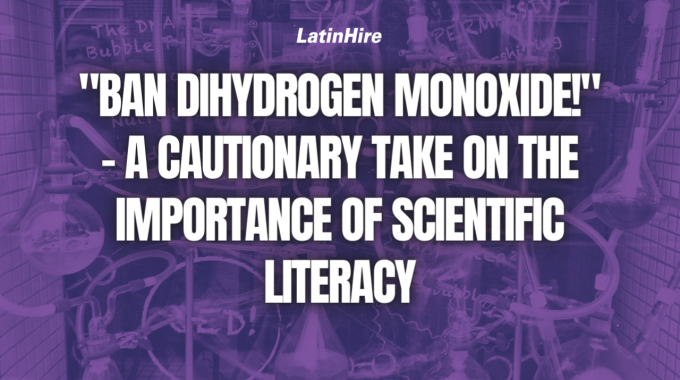In last week’s article, we looked at introducing quantum numbers using a condo analogy as…

“Ban Dihydrogen Monoxide!” – A Cautionary Take on the Importance of Scientific Literacy
Scientific literacy is not just a skill – it is a key to unlocking a world of knowledge, critical thinking, and informed decision-making. In an era dominated by technology and an overload of information, the ability to understand, analyze, and apply scientific concepts has never been more crucial.
One infamous case that highlights the dire consequences of scientific illiteracy is the story of a student’s petition to ban “dihydrogen monoxide”, revealing the alarming gaps in public understanding and the urgent need for a revamp in scientific literacy.
Story of the “Invisible Killer”

In 1997, an unsuspecting student conducted an intriguing social experiment that exposed the astonishing lack of scientific literacy among the general public. The student’s petition to ban dihydrogen monoxide received hundreds of signatures, highlighting the dangerous extent to which people can be misled when they lack the necessary understanding of basic scientific principles.
The student stated in his petition that dihydrogen monoxide is:
- A major component of acid rain
- A contributor to the greenhouse effect
- Able to cause severe burns
- The main cause of landscape erosion
- Speeding up the rusting of metals
- Often used in nuclear power plants
- Necessary for the distribution of pesticides
- Dumped into the rivers and oceans
(And many more…)
Little did those hundreds of petition signers know that dihydrogen monoxide is, in fact, the scientific term for water (H2O)!
The Shocking Reality of Scientific Literacy

The dihydrogen monoxide incident serves as a cautionary tale, underscoring the profound consequences of scientific illiteracy. In a world where complex scientific information is constantly disseminated through media and the Internet, individuals who lack the ability to critically evaluate such information are at a significant disadvantage.
Scientific illiteracy can lead to a range of issues including:
1) Misinformed decision-making: Without a basic understanding of scientific principles, people are vulnerable to making misguided decisions that can impact their health, safety, and overall well-being. MIsinterpreting scientific claims can lead to the adoption of harmful practices or avoidance of beneficial ones.
2) Pseudoscience and misinformation: Scientific illiteracy creates fertile ground for the spread of pseudoscientific ideas and misinformation. Individuals may fall prey to sensationalized claims and conspiracy theories, further perpetuating falsehoods and spreading confusion.
3) Policy and legislation: Inadequate scientific literacy among policymakers can result in ill-informed decisions that affect entire communities. Sound policies addressing public health, environmental concerns, and technological advancements rely on a comprehensive understanding of scientific concepts.
4) Technological progress: Scientific literacy is essential for harnessing the benefits of technological advancements. Individuals who lack understanding may struggle to adapt to new technologies or contribute to innovation.
The Path to Scientific Literacy

The dihydrogen monoxide experiment emphasizes the urgency of promoting and enhancing scientific literacy at all levels of education and society. Here are some steps that can be taken to foster scientific literacy:
1) Strengthen science education: Schools and education institutions should prioritize science education that emphasizes critical thinking, hands-on experimentation, and the understanding of fundamental scientific principles.
2) Promote media literacy: Teaching students to critically evaluate scientific information in media sources can empower them to discern credible sources from misinformation.
3) Engage in scientific outreach: Scientists and educators should actively engage with the public through accessible forums, workshops, and online platforms, demystifying complex concepts and promoting a culture of curiosity.
4) Engage curiosity: Fostering a sense of wonder and curiosity about the natural world can inspire individuals to seek out scientific knowledge and explore its practical applications.
The story of the dihydrogen monoxide petition serves as a stark reminder of the critical importance of scientific literacy in today’s information-driven world. How do you teach your students to be scientifically literate? Share your ideas in the comments below!



